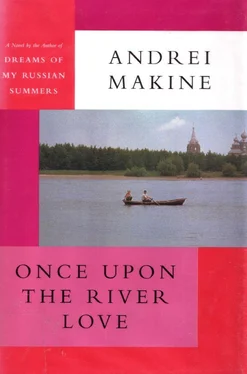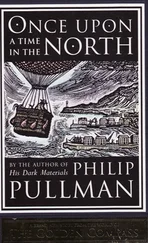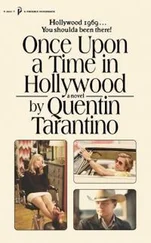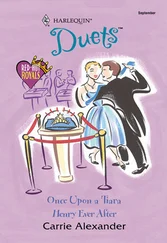All at once we saw orange among the trees… Yes, a patch of color like the fragments of bark scattered over the snow between the black trunks and branches. It was Samurai – he was far-sighted – who cried: "Look, it's a tiger!"
And as soon as the word was spoken, the fragments of bark assembled themselves into the body of a powerful cat.
"A Manchurian tiger," breathed Utkin with admiration.
The tiger was there, two hundred yards from the train, and seemed to be staring at us calmly. It probably crossed the track at this time every morning, and it must have been very surprised to see our spanking-new train upsetting its habits as master of the taiga.
The train moved off, and we thought we could discern the instant tension in the muscles of this royal body, ready to make a long leap to avoid danger…
There was no other stop until the end. We gave up worrying, for we realized that some time back, our journey had turned from a harmless escapade into a real adventure. We must live it as such. Maybe this crazy train would never stop…?
Utkin's compass was now indicating a southerly direction. The sky gradually clouded over, the outlines of the hills became blurred. And the taste of the breeze pouring in at the lowered window escaped all definition: tepid? humid? free? crazy?
Its singular tang became stronger, thicker. And as if the locomotive had finally wearied of struggling against this increasingly dense flux, as if the new coaches were becoming engulfed in this scented stream, the train slowed down, rolled along past some insignificant suburb, then beside a long platform, and finally stopped.
We stepped down from the train into the heart of an unknown city. With the instinct of savages, we followed an avenue that brimmed with the powerful breeze we had already detected in our coach. Now we wanted to reach its source. First came a cluster of ugly low buildings, warehouses with gaping doors, then the dark spires of the cranes…
And suddenly it was the end of the world!
The horizon vanished into soft mist. The land ended a few steps in front of us. The sky began at our feet.
We had stopped on the Pacific shore. It was its powerful breeze that had brought our train to a halt…
We had followed the same legendary route as the Cossacks of old. And, like them, we remained in silence for a long moment, inhaling the iodine scent of the seaweed, trying to grasp the inconceivable.
Now the point of our journey became clear to us. Unable to reach the Western World of our dreams, we had employed cunning. We had headed eastward, to the extreme limit. Yes, all the way to that Far East where the east and the west meet in the misty abyss of the ocean. Unconsciously we had employed the Asiatic trickery of Manchurian tigers: to outwit a hunter following their tracks, they move through the taiga in a great circle, until at a certain moment they are behind their pursuer…
It was thus that, pretending to run away from the unattainable West, we now found ourselves at its back.
We stretched our hands out into the waves lapping below the pebbles. The water had a harsh, salty taste. We laughed, licking our fingers…
Facing the immensity of the ocean, the city seemed almost small. It resembled all the medium-sized cities of the empire. Nerlug, for example: the same rows of prefabricated houses, the same street names – Lenin Avenue, October Square – the same slogans on strips of red calico. But there was also the port and the neighboring district…
It was here that the presence of the West could best be detected. First of all, the ships. With their great white masses, they towered over the bustle on the quays, the mountains of crates, the warehouse buildings. We tilted our heads back to read their names, to admire the fluttering of their many-colored pennants.
The crowd on the streets of the port bore no relation to the gloomy parade of faces that you encountered at Nerlug. The bright coats of the young, smiling women; the black jackets of the sailors, whose lively eyes, wearied by the misty desert wastes of the ocean, hungrily devoured the feast of things and people. From time to time one heard snatches of talk in a foreign language. We would turn. Sometimes we saw the face, with slanting eyes, of a Japanese; sometimes the blond beard of a Scandinavian. It is true that it was quite common to see billboards calling on the people to increase the productivity of their labor or to advance toward the final victory of communism. But here they carried no more weight than that of a splash of color in the panorama of the port district…
Among these women who walked bareheaded, these sailors dressed in short jackets and berets with black ribbons fluttering in the wind; among these foreigners with their light, elegant clothes, we felt like real extraterrestrials. Our sheepskin coats, our great tousled fur shapkas, and our thick felt boots showed that we came from the depths of the Siberian winter. But strangely, we did not feel any unease. We had sensed at once the hospitable character of these streets. They played host to people from the most exotic corners of the globe, people whom nothing could surprise. We walked along in the middle of the animated crowd, breathing in the iodine-scented wind of the mighty deep… And we were no longer ourselves!
We were our dream doubles: Lover, Warrior, Poet.
My gaze, like that of a sparrow hawk, intercepted on the wing the rapid glances of women thrown in our direction. Samurai advanced proudly, a light smile playing on his lips, a glint of tiredness in his eyes – a soldier after a temporary victory in an endless war. As for Utkin, he realized that for the first time nobody noticed the way he walked. For one could not proceed any other way in these streets: the wind threw open the front panels of the women's bright coats, flapped the sailors' broad pants, made foreigners reel. Utkin pointed his shoulder up at the sky, and it was very natural: all the passersby felt as if they were taking off, carried away by the Pacific wind. Furthermore, there was so much to see that we kept stopping all the time. Utkin already knew how to enjoy these pauses, where his limping gait disappeared… but in these streets it was pointless to hide it; quite the reverse: his injured foot became the token of a unique personal past in the theatrical melting pot of the crowd.
"It would be good to buy something to eat," the Poet finally dared to suggest.
"All I've got is fourteen kopecks," said the Lover. "A loaf of bread for three, that will be enough."
The Warrior was silent. Then, without explaining anything to us, he headed for one of the human whirlpools in the middle of the little square. We could see people exchanging packages, examining clothes, shoes. A dockside market. Samurai disappeared into the crowd for several minutes, then reappeared, smiling.
"We're going to eat lunch in a restaurant," he announced.
Questions were useless. We knew that Samurai had just sold his "rhinoceros," a gold nugget with a bump reminiscent of the animal's horn – a big nugget, the size of a thumbnail. He had always told us that he would save it for a special occasion…
The waiters looked at us uncertainly, no doubt wondering whether to throw us out or put up with us. Samurai's resolute air and his masterful tone overwhelmed them. They presented us with the menu.
At lunch we talked about Belmondo. Without mentioning his name, we referred to his adventures as if they had been experienced by close acquaintances of ours – or by ourselves. The conversation, somewhere between worldly gossip and a dialogue among secret agents, got under way.
"He was wrong to get himself involved in that business with the theft of the picture," began Samurai in an argumentative tone of voice, as he cut up his steak.
Читать дальше












